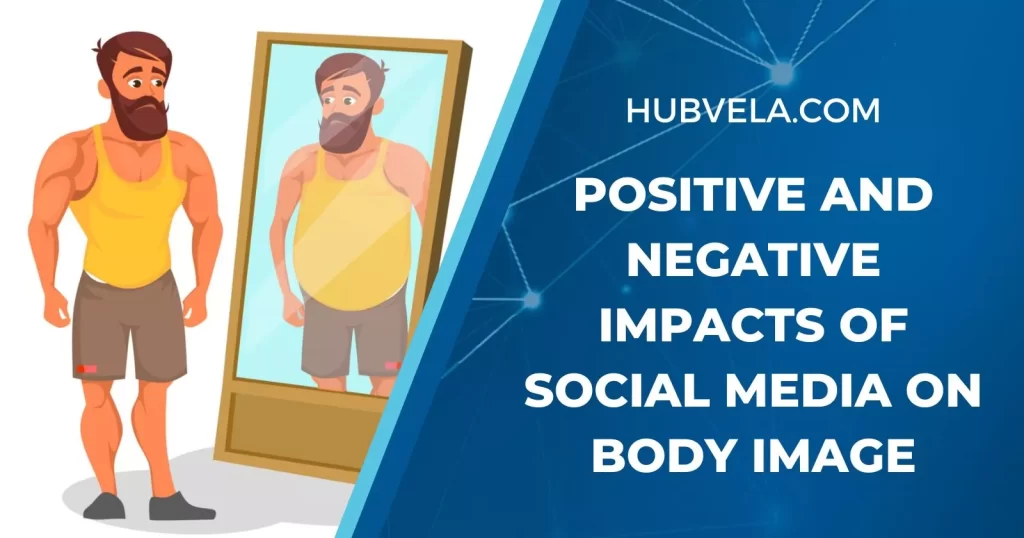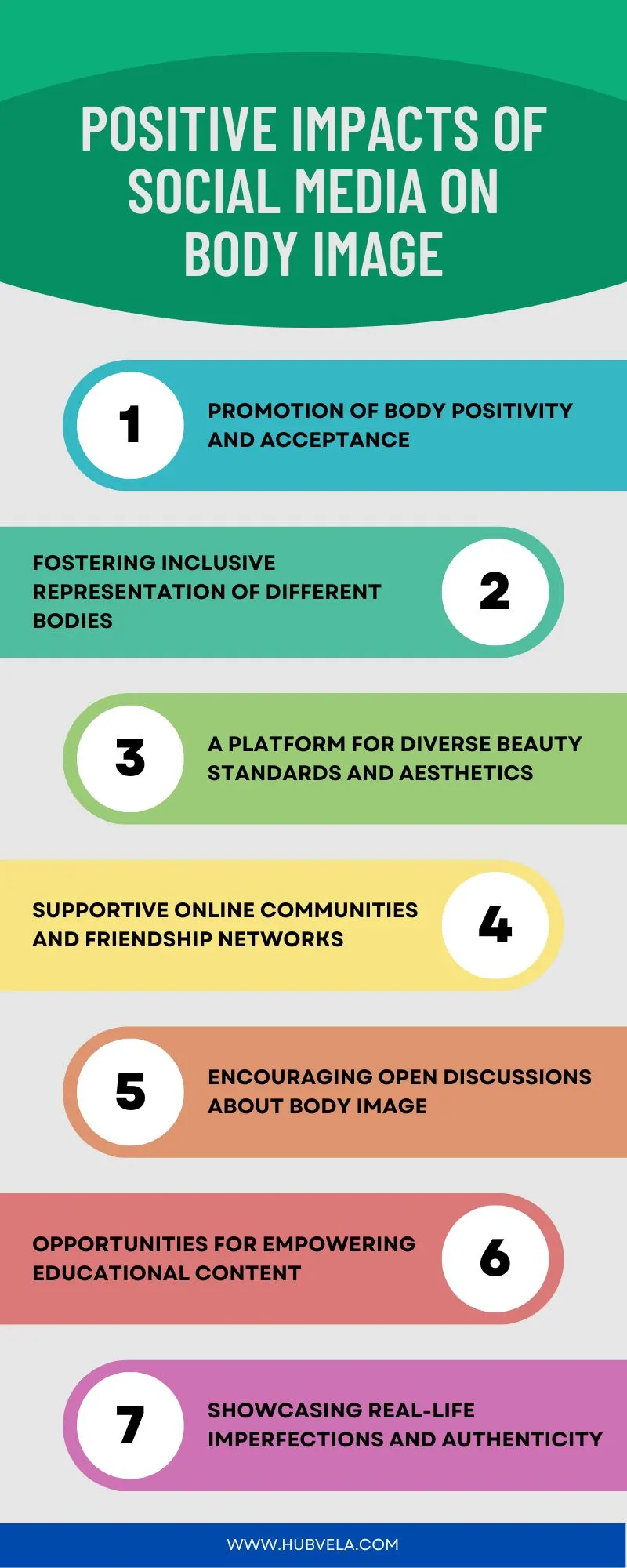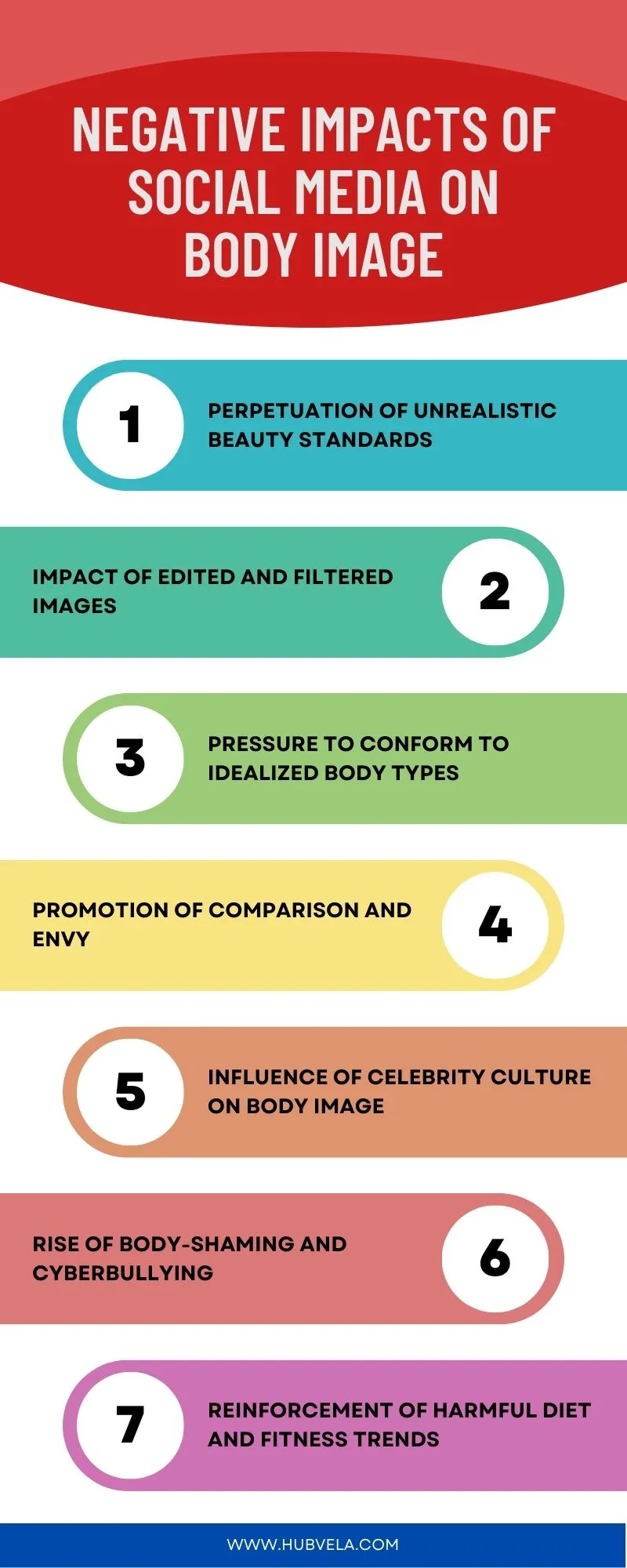Social media has become an integral part of modern life, with millions of people using it every day. While social media has many benefits, it can also have negative effects on body image.
Social media can expose users to hundreds or even thousands of images and photos every day, including those of celebrities and fashion or fitness models, which can lead to an internalization of beauty ideals that are unattainable for almost everyone, resulting in greater dissatisfaction with body weight and shape.
However, social media can also have positive effects on body image and can promote body positivity. Viewing body-positive content on social media platforms can help individuals become more accepting and appreciative of their bodies.
In this article, we will explore the positive and negative impacts of social media on body image and provide tips for using social media in a more positive way.

--Advertisement--
Positive Effects of Social Media on Body Image
Social media has become an integral part of our lives, and it has both positive and negative effects on our mental health and body image.
While social media can be a source of unrealistic beauty standards and contribute to body dissatisfaction, it can also have a positive impact on body image.
In recent years, social media has become a platform for body positivity, and it has helped to break out of the traditional beauty standards by giving a more accurate depiction of diverse body shapes and sizes.
We will explore the positive effects of social media on body image and how it can help individuals maintain a healthy and positive outlook on their body image.

1. Promotion of Body Positivity and Acceptance
The promotion of body positivity and acceptance is a significant aspect of the positive effects of social media on body image.
Social media platforms have become a space where people can share their experiences and struggles with body image, and this has led to the emergence of body-positive movements.
These movements encourage people to embrace their bodies, regardless of their shape, size, or appearance. Social media has also given a voice to marginalized groups, such as plus-size individuals, who have been traditionally underrepresented in mainstream media.
By promoting body positivity and acceptance, social media has helped to challenge the unrealistic beauty standards that have been perpetuated by the media for decades.
This has led to a more inclusive and diverse representation of bodies in the media, which can have a positive impact on people’s body image and self-esteem.
2. Fostering Inclusive Representation of Different Bodies
Social media platforms have become powerful tools for challenging traditional beauty standards and advocating for a more inclusive representation of different bodies.
By featuring individuals of various shapes, sizes, and colors, social media can help counteract the negative impact of unrealistic beauty ideals on body image.
One of the key benefits of fostering inclusive representation of different bodies on social media is the potential to boost self-esteem and body confidence.
When individuals see a diverse range of bodies being celebrated and embraced, they are more likely to feel accepted and validated in their own unique appearances.
This can help to alleviate the pressure to conform to narrow beauty standards and encourage individuals to embrace their own bodies as they are.
Moreover, fostering inclusive representation on social media can also contribute to a more accepting and diverse society. By showcasing a variety of body types and sizes, social media platforms can challenge the notion that there is a single “ideal” body type.
This can lead to increased acceptance and appreciation of different bodies, fostering a more inclusive and tolerant society where individuals are valued for their uniqueness rather than their adherence to societal beauty norms.
3. A platform for Diverse Beauty Standards and Aesthetics
The platform for diverse beauty standards and aesthetics is a significant positive effect of social media on body image.
Social media has provided a space for people to share their unique beauty standards and aesthetics, which has helped to break down traditional beauty standards that were once narrow and exclusive.
Social media has given a voice to individuals who were previously underrepresented in mainstream media, allowing them to share their stories and experiences.
This has helped to promote body positivity and self-love, as people are now able to see and appreciate a wider range of body types and beauty standards.
Social media has also allowed people to connect with others who share similar experiences and struggles, creating a sense of community and support.
The platform for diverse beauty standards and aesthetics on social media has helped to promote a more inclusive and accepting culture around body image.
4. Supportive Online Communities and Friendship Networks
Supportive online communities and friendship networks play a crucial role in the positive effects of social media on body image. These communities provide a safe and inclusive space for individuals to connect with others who share similar experiences and struggles.
Through these online platforms, people can find support, encouragement, and validation from others who understand their journey towards body acceptance and self-love.
These communities foster a sense of belonging and provide a space for individuals to share their stories, seek advice, and offer support to one another.
Friendship networks formed through social media can also be instrumental in promoting body positivity and challenging societal beauty standards.
By surrounding themselves with like-minded individuals who prioritize self-acceptance and body diversity, individuals can build resilience against negative body image influences and develop a more positive perception of themselves.
These supportive online communities and friendship networks create a sense of empowerment and solidarity, ultimately contributing to improved body image and mental well-being.
5. Encouraging Open Discussions About Body Image
Social media can have a positive impact on body image by connecting individuals with others who help build a body-accepting community.
Social media can be used to spread body positivity and create a sense of community that makes tackling body image issues feel less isolating.
Encouraging open discussions about body image on social media can make a positive impact on how people view themselves and their bodies, especially when it comes to young people.
Social media can be used to promote body image advocacy and support the eating disorder community.
Researchers from the School of Psychology at UNSW Sydney found that viewing body-positive posts on social media can improve body satisfaction and appreciation, help reduce harmful comparisons, and challenge unhealthy beauty standards.
Therefore, social media can be a powerful tool to promote positive body image and encourage open discussions about body image.
6. Opportunities for Empowering Educational Content
The use of social media can create a sense of community that makes tackling body image issues feel less isolating.
Social media can also positively impact body image in a number of ways, such as through health and wellness, fitness, and plant-based food accounts that can all be inspirational models for some users.
The landscape of body positivity on the internet has created a more understanding and inclusive space for all body types, which can benefit the way women feel about their body image.
Opportunities for empowering educational content exist in promoting positive body image on social media. Practitioners can show learners examples or campaigns that encourage acceptance and appreciation of all body shapes, sizes, and appearances.
Research has found that body-positive posts on social media led to improvements in young women’s body satisfaction and appreciation.
By raising awareness of content that has the potential to harm and promoting positive content, social media can be used to support the eating disorder community and promote body image advocacy.
7. Showcasing Real-Life Imperfections and Authenticity
Social media platforms have become a space where people can share their real-life imperfections and authenticity, which can help to challenge the unrealistic beauty standards perpetuated by traditional media.
Many influencers and celebrities have started to share unedited photos and videos of themselves, showing their natural bodies and flaws.
This has helped to promote body positivity and self-acceptance, as people can see that even those who are considered “perfect” in the media have imperfections.
Additionally, social media has given a voice to marginalized groups, allowing them to share their stories and experiences, which can help to challenge the narrow beauty standards that have been perpetuated for decades.
Negative Effects of Social Media on Body Image
Social media has become an integral part of our lives, and it has a significant impact on how we perceive ourselves, particularly our body image.
The phrase “body image” refers to how one perceives, thinks, feels, and acts toward their body, ranging from positive to negative perceptions. Social media exposure could foster body dissatisfaction and result in risky eating behaviors.
Users need to be aware of the negative effects of social media on body image, as the consequences can be devastating to the mental health of users.
Although social media can have a positive effect on the mental health of some of its users, early research indicates that it negatively affects people’s perception of their body image.
We will explore the negative effects of social media on body image and how it impacts our mental health.

1. Perpetuation of Unrealistic Beauty Standards
Social media has a significant impact on body image, both positive and negative. One of the negative effects is the perpetuation of unrealistic beauty standards, which can damage mental health.
Social media platforms often feature images of people with seemingly perfect faces and bodies, often using filters and photo editing tools to enhance their appearance.
This can create unrealistic beauty standards, leading to body dissatisfaction and low self-esteem in both women and men.
Young girls and women see fashion models who exhibit features that are praised by the media and realize their incapability to live up to those standards, which can trigger anxiety and eating or mood disorders.
Although some “body positive” influencers argue that showing their imperfections eliminates the damaging and unattainable standards for one’s body on social media and boosts the self-confidence of social media users, models, and influencers continue to post perfected images of their bodies with no claims to photoshop or plastic surgery, still enforcing this impossible beauty standard on social media.
2. Impact of Edited and Filtered Images
The impact of edited and filtered images on social media can have negative effects on body image. The use of filters and photo-editing apps allows individuals to alter their facial features, eliminate blemishes, and modify body proportions, creating an illusion of perfection.
This manipulation of reality can erode the confidence of both the people creating these images and those viewing them. It can contribute to a negative view of body image and body dysmorphia.
Studies have shown that a significant number of teenagers have edited their faces or bodies in digital photos due to poor body image, which can lead to severe body dysmorphia later in life.
The constant exposure to these edited images on social media platforms can exacerbate feelings of self-doubt and dissatisfaction with one’s own appearance.
It is important to recognize that the images we see on social media are not always reflective of reality and to be mindful of the potential impact they can have on our body image and self-esteem.
3. Pressure to Conform to Idealized Body Types
Social media can have a negative impact on body image by exposing users to “idealized” body types, leading to constant comparisons and unrealistic expectations.
This pressure to conform to idealized body types can cause unrealistic expectations of how one’s body should look and can lead to unhealthy eating behaviors and disordered eating.
Studies have found a correlation between the time spent on social media and a negative body image, especially when participants were scrolling through appearance-related content, like the accounts of fitness instructors or models on Instagram.
Social media images are often filled with people presenting the best version of themselves, leading to a distorted perception of reality. Therefore, it is important to limit social media use to reduce the negative effects on body image.
4. Promotion of Comparison and Envy
Social media has a negative impact on body image by promoting comparison and envy, especially among young people.
Social media platforms expose users to hundreds or even thousands of images and photos every day, including those of celebrities and fashion or fitness models, which leads to an internalization of beauty ideals that are unattainable for almost everyone, resulting in greater dissatisfaction with body weight and shape.
A survey taken by Marika Tiggemann and Amy Slater found that the more Facebook friends girls had, the more likely it was that they had body image concerns.
Social media users often compare themselves to others, which can lead to feelings of envy and inadequacy. To reduce harm on social media, users can unfollow accounts, find a healthy community, and take breaks.
5. Influence of Celebrity Culture on Body Image
The influence of celebrity culture on body image is a significant factor in the negative effects of social media on body image.
Social media platforms are filled with images of celebrities with “perfect” bodies, which can lead to unrealistic expectations and dissatisfaction with one’s own body.
Celebrities are often portrayed as having the ideal body type, which can create a sense of pressure to conform to these standards. This pressure can lead to unhealthy behaviors such as extreme dieting, over-exercising, and even eating disorders.
The constant exposure to these images can also lead to a distorted perception of what a healthy body looks like, which can have long-term effects on mental and physical health.
It is important to recognize the influence of celebrity culture on body image and to promote body positivity and self-acceptance.
6. Rise of Body-Shaming and Cyberbullying
Social media has contributed to the rise of body-shaming and cyberbullying, which can have long-lasting impacts on the emotional well-being of its users.
Body shaming, or making critical comments about the shape or size of someone else’s body, is a common form of cyberbullying that can take place on all forms of social media.
Unfortunately, our society views thinness as the gold standard of beauty, so people who deviate from that body type are often ridiculed and made to feel inferior.
Exposure to idealized beauty standards on social media can lead to negative body image, disordered eating, depression, and anxiety. Cyberbullying can take many forms, including mean comments, threats, rumors, and even fake accounts created to harass someone.
The constant exposure to negative comments and criticism can damage a person’s self-esteem and lead to feelings of inadequacy and low self-worth.
7. Reinforcement of Harmful Diet and Fitness Trends
Social media can reinforce harmful diet and fitness trends, which can negatively impact body image.
Social media can expose users to hundreds or even thousands of images and photos every day, including those of celebrities and fashion or fitness models, which can lead to an internalization of beauty ideals that are unattainable for almost everyone, resulting in greater dissatisfaction with body weight and shape.
Additionally, social media can contribute to unrealistic beauty standards and unhealthy comparisons. However, social media can also have positive effects on body image and can promote body positivity.
Viewing body-positive content on social media platforms can help individuals become more accepting and appreciative of their bodies. It is important to examine ways to use social media in a positive way to avoid a negative body image.
It is important to take a break from social media if you feel worse after using it. Additionally, examine who you are following on social media and unfollow accounts that make you feel negatively about your body.
Conclusion on Positive and Negative Impacts of Social Media on Body Image
In conclusion, social media can have both negative and positive effects on body image. Research has shown that social media exposure contributes to body dissatisfaction and disordered eating, leading to unrealistic expectations of how one’s body should look.
Social media can negatively affect body image by over-exposing users to “idealized” body types, leading to more frequent body and weight comparisons and more negative feelings about one’s own body.
However, social media can also have positive effects on body image by promoting body positivity and providing a platform for body-positive content and communities.
To reduce harm on social media, it is recommended to unfollow accounts that make you feel negative about your body, find a healthy community, and take breaks from social media.


